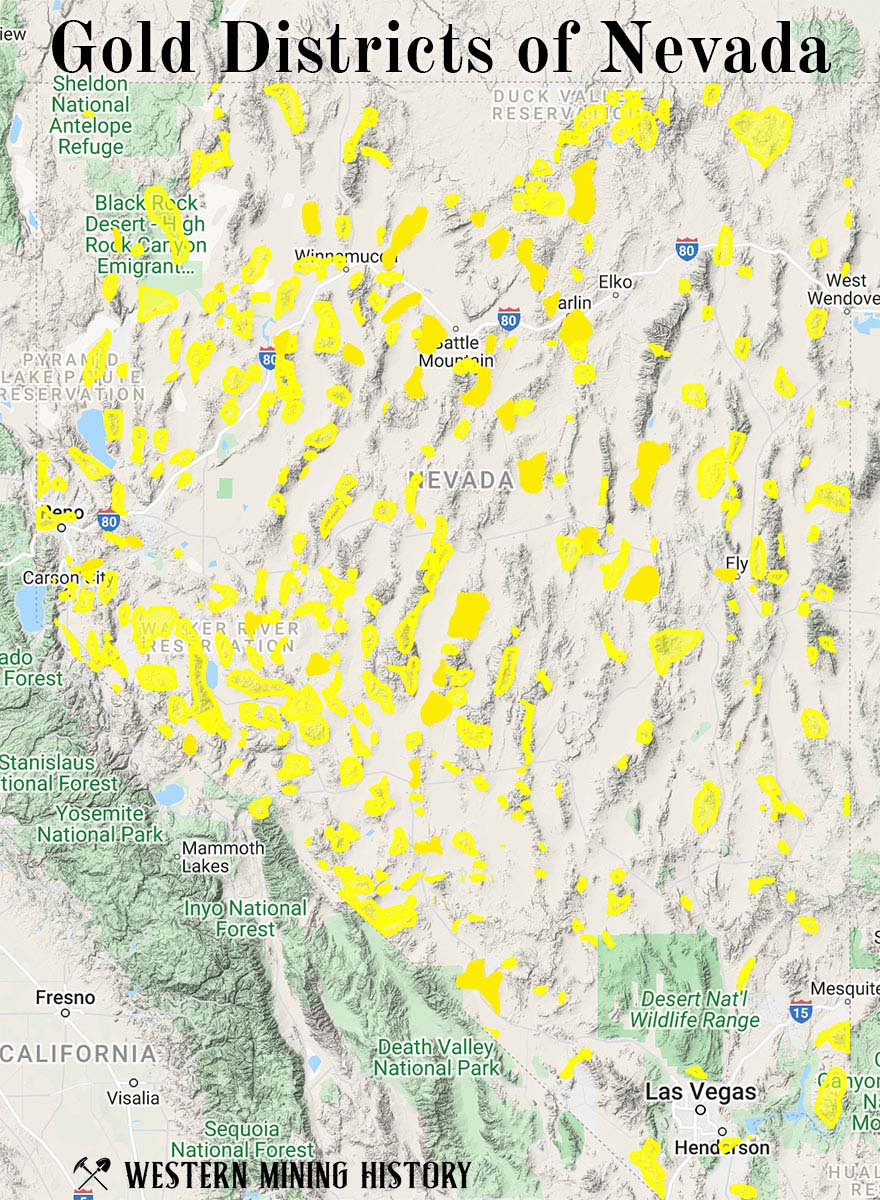The Horseshoe Mine is a gold mine located in White Pine county, Nevada at an elevation of 6,972 feet.
About the MRDS Data:
All mine locations were obtained from the USGS Mineral Resources Data System. The locations and other information in this database have not been verified for accuracy. It should be assumed that all mines are on private property.
Mine Info
Elevation: 6,972 Feet (2,125 Meters)
Commodity: Gold
Lat, Long: 39.9196, -115.50140
Map: View on Google Maps
Horseshoe Mine MRDS details
Site Name
Primary: Horseshoe Mine
Secondary: Horseshoe/Galaxy Mine
Secondary: part of Mooney Basin Mine Area
Commodity
Primary: Gold
Location
State: Nevada
County: White Pine
District: Bald Mountain District
Land Status
Land ownership: BLM Administrative Area
Note: the land ownership field only identifies whether the area the mine is in is generally on public lands like Forest Service or BLM land, or if it is in an area that is generally private property. It does not definitively identify property status, nor does it indicate claim status or whether an area is open to prospecting. Always respect private property.
Administrative Organization: Ely BLM district
Holdings
Not available
Workings
Not available
Ownership
Owner Name: Barrick Gold Corp.
Info Year: 2006
Production
Not available
Deposit
Record Type: Site
Operation Category: Producer
Deposit Type: sediment-hosted gold
Operation Type: Surface
Year First Production: 1991
Year Last Production: 1992
Years of Production:
Organization:
Significant: Y
Deposit Size: S
Physiography
Not available
Mineral Deposit Model
Model Name: Sediment-hosted Au
Orebody
Not available
Structure
Type: R
Description: The Bald Mountain district is located in an area of thinned crust along the eastern side of the Late Proterozoic rift that split the North American craton. It is also in the west-central portion of the Late Devonian-Early Mississippian Antler foreland basin, and near the eastern edge of deformation related to the late Paleozoic Humboldt orogeny To the west of the Bald Mountain district, geologic interpretations are dominated by recognition of Paleozoic deformation, whereas to the east, interpretations emphasize Mesozoic contraction and plutonism and Tertiary extension.
Type: L
Description: At Galaxy, the dominant structure controls are
Alterations
Not available
Rocks
Name: Sedimentary Rock
Role: Host
Age Type: Host Rock
Age Young: Early Mississippian
Age Old: Late Devonian
Analytical Data
Not available
Materials
Ore: Gold
Comments
Comment (Commodity): Ore Materials: gold
Comment (Deposit): Horseshoe has dominant trends of N4050W that are about parallel to the Bida trend.
Comment (Development): Development in the northeastern part of the district began in 1987. The ARM Joint Venture (Amselco with, at dif- ferent times, Occidental Petroleum, Nerco, Kennecott) began relinquishing claim groups north of Alligtor Ridge Mine that were originally staked as part of an agreement with Lyle Campbell. Campbell retained and maintained the claim groups and, in November 1987, leased the Casino-Winrock area of claims to the USMX-Pegasus Joint Venture who began mining the deposit in 1991. Mining commenced in July, 1991 and was completed in 1992. Haul distance was 1.3 miles and strip ratio was 0.93:1. In 2006, Barrick Gold Corp. acquired the Horseshoe Mine property through its acquisition of Placer Dome U. S., Inc.
Comment (Economic Factors): In 1991, the Horseshoe deposit reserves were reported at 1.5 milion tons of ore grading 0.039 opt gold.
Comment (Identification): The Horseshoe Mine deposit is encompassed by Placer Dome?s Mooney Basin mine area.
References
Reference (Location): Rockwell, Barnaby W. and Hofstra, Albert H., 2008, Identification of quartz and carbonate minerals across northern Nevada using ASTER thermal infrared emissivity data?Implications for geologic mapping and mineral resource investigations in well-studied and frontier areas; Geosphere; February 2008; v. 4; no. 1; p. 218-246, Plate 12. http://geosphere.geoscienceworld.org/cgi/content/full/4/1/218/DC1
URL: http://geosphere.geoscienceworld.org/cgi/content/full/4/1/218/DC1
Reference (Location): Nutt, C. J. and Hofstra, A. H., 2007, Bald Mountain Gold Mining District, Nevada: A Jurassic Reduced Intrusion-Related Gold System; Economic Geology, v. 102, pp. 1129?1155. http://econgeol.geoscienceworld.org/cgi/reprint/102/6/1129.pdf
URL: http://econgeol.geoscienceworld.org/cgi/reprint/102/6/1129.pdf
Reference (Deposit): FEIS, 1995
Reference (Deposit): BLM, 2004, Bald Mountain Mine Exploration Program Programmatic Environmental Assessment NV040-04-023, Case File # N78825.
Reference (Deposit): NBMG MI-91 thru MI-00
Reference (Deposit): DEIS, 1995
Reference (Deposit): NBMG MI-88 through MI-02
Reference (Deposit): Nevada Land Status, 1990;
Reference (Deposit): www.placerdome.com
Reference (Deposit): USMX, 1990, Annual report for 1989.
Reference (Deposit): USMX, 1992, Annual report for 1991
Reference (Deposit): The Geological Society of Nevada 1996 Spring Field trip, Geology and Gold Deposits of Eastern Nevada, GSN Special Publication No. 23.
Reference (Deposit): Hitchborn and others, 1996, Geology and Gold Deposits of the Bald Mountain Mining District, White Pine County, Nevada, in Geology and Ore Deposits of the American Cordillera Symposium Proceedings, eds. A. Coyner and P. Fahey.
Reference (Deposit): Nutt, C.J., Hofstra, A.H., Hart, K.S., and Mortensen, J.K., 2000, Structural setting and genesis of gold deposits in the Bald Mountain-Alligator Ridge area, east-central Nevada, in Cluer, J.K., Price, J.G., Struhsacker, E.M., Hardyman, R.F., and Morris, C.L., eds., Geology and Ore Deposits 2000: The Great Basin and Beyond: Geological Society of Nevada Symposium Proceedings, May 15-18, 2000, p. 513-537.
Reference (Deposit): NBMG Map 91, 2nd, 3rd
Reference (Deposit): DEIS, 1995
Reference (Deposit): Nevada Land Status, 1990
Reference (Deposit): Long, K.R., DeYoung, J.H., Jr., and Ludington, S.D., 1998, Database of significant deposits of gold, silver, copper, lead, and zinc in the United States; Part A, Database description and analysis; part B, Digital database: U.S. Geological Survey Open-File Report 98-206, 33 p., one 3.5 inch diskette.
Reference (Deposit): FEIS, 1995
Reference (Deposit): Amer. Mines (1991-92), 1991 thru Amer. Mines (2000), 2001
Nevada Gold

Nevada has a total of 368 distinct gold districts. Of the of those, just 36 are major producers with production and/or reserves of over 1,000,000 ounces, 49 have production and/or reserves of over 100,000 ounces, with the rest having less than 100,000 ounces. Read more: Gold Districts of Nevada.